- Home
- T.A. Barron
The Seven Songs Page 2
The Seven Songs Read online
Page 2
Two gargantuan figures, each as tall as the castle that had once stood on this spot, strode up to the circle. From far away in the mountains they had come, leaving the rebuilding of their ancestral city of Varigal long enough to join the Great Council. Merlin turned, hoping to find his friend Shim. But Shim was not among the new arrivals. The boy sighed, telling himself that Shim would probably have slept through the meeting anyway.
The first giant, a wild-haired female with bright green eyes and a crooked mouth, grunted and bent down to pick up the fallen stone. Although twenty horses would have strained to move it, she placed it back in position without any difficulty. Meanwhile, her companion, a ruddy-skinned fellow with arms as thick as oak trunks, placed his hands on his hips and surveyed the scene. After a long moment, he gave her a nod.
She nodded in return. Then, with another grunt, she lifted both of her hands into the air, seeming to grasp at the streaming clouds. Seeing this, Cairpré raised his bushy eyebrows in puzzlement.
High in the sky, a tiny black dot appeared. Out of the clouds it spiraled, as if caught in an invisible whirlpool. Lower and lower it came, until every eye of every creature in the circle was trained on it. A new hush blanketed the assembly. Even the irrepressible water nymphs fell silent.
The dot grew larger as it descended. Soon massive wings could be seen, then a broad tail, then sunlight glinting on a hooked beak. A sudden screech ripped the air, echoing from one ridge to another, until the land itself seemed to be answering the call. The call of a canyon eagle.
The powerful wings spread wide, stretching out like a sail. Then the wings angled backward, as enormous talons thrust toward the ground. Rabbits and foxes squealed at the sight, and many more beasts cringed. With a single majestic flap, the great canyon eagle settled on the shoulder of the wild-haired giant.
The Great Council of Fincayra had begun.
As the first order of business, the delegates agreed that no one should leave the meeting until all the questions had been decided. Also, at the request of the mice, each of the delegates promised not to eat anyone else during the course of the proceedings. Only the foxes objected to this idea, arguing that the question of what to do with the Flowering Harp alone could take several days to resolve. Even so, the rule was adopted. To ensure compliance, the Grand Elusa herself kindly offered to enforce it. Though she never said just how she planned to do that, no one seemed inclined to ask her.
As its next act, the assembly declared the circle of stones itself a sacred monument. Clearing her throat with the subtlety of a rockslide, the wild-haired giant proposed that the ruins of the Shrouded Castle receive a new name: Dance of the Giants, or Estonahenj in the giants’ own ancient tongue. The assembled delegates adopted the name unanimously, though a heavy silence fell over the circle. For while the Dance of the Giants signified Fincayra’s hope for a brighter future, it was the kind of hope that springs only from the most profound sorrow.
In time, the discussion turned to the fate of Stangmar. While the wicked king had been overthrown, his life had been saved—by none other than Merlin, his only son. Although Merlin himself, being only part Fincayran, was not allowed to voice his own views at the assembly, the poet Cairpré offered to speak on his behalf. After hearing the boy’s plea that his father’s life, no matter how wretched, should be spared, the Great Council argued for hours. Finally, over the strong objections of the giants and the canyon eagle, the assembly decided that Stangmar should be imprisoned for the rest of his days in one of the inescapable caverns north of the Dark Hills.
Next came the question of who should rule Fincayra. The bees suggested that their own queen could rule everyone, but that notion found no support. So fresh was the agony of Stangmar’s kingship that many delegates spoke passionately against having any leader at all. Not even a parliament of citizens would do, they argued, for in time power always corrupts. Cairpré, for his part, denounced such thinking as folly. He cited examples of anarchy that had brought ruin to other peoples, and warned that without any leadership at all Fincayra would again fall prey to that nefarious warlord of the Otherworld, Rhita Gawr. Yet most of the delegates dismissed his concerns. The Great Council voted overwhelmingly to do without any leadership whatsoever.
Then came the gravest question of all. What should be done with the Treasures of Fincayra?
As everyone watched in awe, the Grand Elusa opened the sack by her side and removed the Flowering Harp. Its oaken sound box, inlaid with ash and carved with floral designs, gleamed eerily. A green butterfly wafted over and alighted on its smallest string. With the swipe of one enormous leg, the Grand Elusa shooed the butterfly away, causing the string to tinkle gently. After pausing to listen, she then removed the rest of the Treasures: the sword Deepercut, the Caller of Dreams, the Orb of Fire, and six of the Seven Wise Tools (the seventh one, alas, had been lost in the collapse of the castle).
All eyes examined the Treasures. For a long interval, no one stirred. The stones themselves seemed to lean forward to get a closer look. The delegates knew that, long before the rise of Stangmar, these fabled Treasures had belonged to all Fincayrans, and were shared freely throughout the land. Yet that had left the Treasures vulnerable to thievery, as Stangmar had demonstrated. A spotted hare suggested that each Treasure ought to have a guardian, someone responsible for guarding it and seeing that it was used wisely. That way the Treasures could be shared, but still protected. Most of the representatives agreed. They urged the Grand Elusa to choose the guardians.
The great spider, however, declined. She declared that only someone much wiser could make such important selections. It would take a true wizard—someone like Tuatha, whose knowledge had been so vast, it was said, that he had even found a secret pathway to the Otherworld to consult with Dagda, greatest of all the spirits. But Tuatha had died years ago. In the end, after much urging, the Grand Elusa agreed to watch over the Treasures in her crystal cave, but only until the right guardians could be found.
While that solved the problem of the Treasures for the time being, it did not answer the question of the Flowering Harp. The surrounding countryside, afflicted by the Blight of Rhita Gawr, showed no sign of life, not even a sprig of green grass. The Dark Hills, especially, needed help, for the damage there had been the most severe. Only the magic of the Harp could revive the land.
Yet who should be the one to carry it? The Harp had not been played for many years, since Tuatha himself had used it to heal the forest destroyed by the dragon of the Lost Lands. While that forest had eventually returned to life, Tuatha had admitted that playing the Harp had required even more of his skill than lulling the enraged dragon into enchanted sleep. The Harp, he had warned, would only respond to the touch of someone with the heart of a wizard.
The oldest of the peacocks was the first to try. Spreading his radiant tail feathers to the widest, he strutted over to the Harp and lowered his head. With a swift stroke of his beak, he plucked one of the strings. A pure, resonant tone poured forth, lingering in the air. But nothing else happened. The Harp’s magic lay dormant. Again the peacock tried, again with no result beyond a single note.
One by one, several other delegates came forward. The unicorn, her white coat glistening, slid her horn across the strings. A stirring chord resulted, but nothing more. Then came an immense brown bear, a dwarf whose beard fell below his knees, a sturdy-looking woman, and one of the water nymphs, all without success.
At last, a tan-colored toad hopped out of the shadows by Merlin’s feet and over to the Grand Elusa. Stopping just beyond the great spider’s reach, the toad rasped, “You may not be a wizarrrrd yourrrrself, but I rrrreally believe you have the hearrrrt of one. Would you carrrry the Harrrrp?”
The Grand Elusa merely shook her head. Lifting three of her legs, she pointed in the direction of Cairpré.
“Me?” sputtered the poet. “You can’t be serious! I have no more the heart of a wizard than the head of a pig. My knowledge so spare, my wisdom too rare. I could never make the
Harp respond.” Stroking his chin, he turned to the boy by his side. “But I can think of someone else who might.”
“The boy?” growled the brown bear skeptically, even as the boy himself shifted with unease.
“I don’t know whether he has the heart of a wizard,” Cairpré acknowledged, with a sidelong glance at Merlin. “I doubt even he knows.”
The bear slammed his paw against the ground. “Then why do you propose him?”
The poet almost smiled. “Because I think there is more to him than meets the eye. He did, after all, destroy the Shrouded Castle. Let him try his hand with the Harp.”
“I agree,” declared a slender owl with a snap of her jaws. “He is the grandson of Tuatha.”
“And the son of Stangmar,” roared the bear. “Even if he can awaken its magic, he cannot be trusted.”
Into the center of the circle stepped the wood elf, her nut brown hair rippling like a stream. She bowed slightly to Rhia, who returned the gesture. Then, in a lilting voice, she addressed the group. “The boy’s father I know not, though I am told that, in his youth, he often played in Druma Wood. And, like the twisted tree that might have grown straight and tall, I cannot say whether the fault lay with him or with the elders who did not give him their support. Yet I did know the boy’s mother. We called her Elen of the Sapphire Eyes. She healed me once, when I was aflame with fever. There was magic in her touch, more magic than even she understood. Perhaps her son has the same gift. I say we should let him try the Harp.”
A wave of a agreement flowed through the assembly. The bear paced back and forth, grumbling to himself, but finally did not object.
As Merlin rose from the pillar, Rhia wrapped her leaf-draped arm around his own. He glanced at her gratefully, then stepped slowly over to the Harp. As he carefully retrieved it, cradling the sound box in his arms, the assembled delegates fell silent once again. The boy drew a deep breath, raised his hand, and plucked one of the strings. A deep note hung in the air, vibrating, for a long moment.
Sensing nothing remarkable had happened, Merlin turned a disappointed face toward Rhia and Cairpré. The brown bear growled in satisfaction. All at once, the canyon eagle, still perched on the giant’s shoulder, screeched. Others joined the cry, roaring and howling and thumping with enthusiasm. For there, curling over the toe of Merlin’s own boot, was a single blade of grass, as green as a rainwashed sapling. He smiled and plucked the string again, causing several more blades of grass to spring forth.
When, at last, the commotion subsided, Cairpré strode over to Merlin and clasped his hand. “Well done, my boy, well done.” Then he paused. “It is a grave responsibility, you know, healing the lands.”
Merlin swallowed. “I know.”
“Once you begin this task, you must not rest until it is finished. Even now, the forces of Rhita Gawr are making plans for a renewed assault. You may be certain of that! The Dark Hills, where many of the forces lie hidden in caves and crevasses, are the lands most scarred from Blight—and also most vulnerable to attack. Our best protection is to restore the hills quickly so that peaceful creatures may return there to live. That will discourage the invaders, and also ensure that the rest of Fincayra will have warning of any attack.”
He tapped the oaken instrument gently. “So you must begin in the Dark Hills—and remain there until the job is done. Save the Rusted Plains, and the other lands yearning to live again, until later. The Dark Hills must be healed before Rhita Gawr returns, or we will have lost our only chance.”
He chewed his lip thoughtfully. “And one thing more, my boy. Rhita Gawr, when he does return, will be looking for you. To show his gratitude for how much trouble you have caused him. So avoid doing anything that might attract his attention. Just stick to your work, healing the Dark Hills.”
“But what if, after I’ve left here, I can’t make the Harp work?”
“If the Harp simply does not respond to your touch, we will understand. But remember: If you can make it work but shirk your task, you will never be forgiven.”
Merlin nodded slowly. As the delegates looked on, he started to slip the Harp’s leather sling over his shoulder.
“Wait!”
It was the voice of the hag, Domnu. Advancing toward the boy, she opened wide her eyes, sending waves of wrinkles across the top of her scalp. Then she lifted her arm and pointed a knobby finger at him. “The half-human boy cannot carry the Harp. He must leave this island! For if he stays, Fincayra is doomed.”
Nearly everyone cringed at her words, none more than Merlin himself. They carried strange power, cutting deeper than any sword.
Domnu shook her finger. “If he does not leave, and soon, all of us will perish.” A chill wind passed through the circle, making even the giants shiver. “Have you all forgotten the prohibition, laid down by Dagda himself, against anyone with human blood remaining long on this island? Have you all forgotten that this boy was also born here, despite an even more ancient prohibition? If you let him carry the Harp, he will surely claim Fincayra as his rightful home. He probably has no intention of returning to the world beyond the mist. Heed my warning. This boy could upset the very balance between the worlds! He could bring the wrath of Dagda down upon us all. Even worse,” she added with a leer, “he could be a tool of Rhita Gawr, like his father before him.”
“I am not!” Merlin objected. “You just want me banished so you don’t have to give me back the Galator.”
Domnu’s eyes flamed. “There, you see? He is speaking to the Great Council, even though he is not truly one of us. He has no respect for Fincayra’s laws, just as he has no respect for the truth. The sooner he is exiled, the better.”
Many heads nodded in the crowd, caught by the spell of her words. Merlin started to speak again, but someone else spoke first.
It was Rhia. Her gray-blue eyes alight, she faced the hairless hag. “I don’t believe you. I just don’t.” Drawing a deep breath, she added, “And aren’t you the one who has forgotten something? That prophecy, that very old prophecy, that only a child of human blood can defeat Rhita Gawr and those who serve him! What if that means Merlin? Would you still want us to send him away?”
Domnu opened her mouth, baring her blackened teeth, then shut it tight.
“The giiirl speeeaks the truuuth,” thundered the deep voice of the Grand Elusa. Lifting her vast bulk with her eight legs, she peered straight at Domnu. “The boooy shooould staaay.”
As if the spell had been broken, delegates of all descriptions thumped, growled, or flapped their agreement. Seeing this, Domnu grimaced. “I warned you,” the hag grumbled. “That boy will be the ruin of us all.”
Cairpré shook his head. “Time will tell.”
Domnu glared at him. Then she turned and disappeared into the crowd—but not before shooting a glance at Merlin that made his stomach clench.
Rhia turned to Cairpré. “Aren’t you going to help him put it on?”
The poet laughed, tossing his shaggy mane. “Of course.” He lifted the Harp’s leather sling over Merlin’s head, resting it on the boy’s shoulder. “You know this is a responsibility, my boy. All of us depend on you. Even so, may it also be a joy! With every strum of those strings, may you bring another field to flower.”
He paused, gazing thoughtfully at Merlin. Lowering his voice, he added, “And may you heal yourself, even as you heal the land.”
A roar of approval echoed around the sacred ring. With that, the Great Council of Fincayra disbanded.
PART ONE
1: RESCUER
Reaching the top of the rise, I hoisted the Flowering Harp a little higher on my shoulder. The first rays of dawn streaked across the sky, painting the clouds scarlet and crimson. Ruby light licked the farthest hills, igniting the few spindly trees that stood like forgotten hairs on the horizon. Yet despite the flaming trees, the hills themselves remained darkened, the same color as the brittle blades of grass under my leather boots—the color of dried blood.
Even so, as my feet crunc
hed against the parched hillside, I began to smile. I barely noticed the chill wind that pierced my brown tunic and bit my cheeks. For I felt already warmed by my task. The task I had pursued now for more than three weeks. The task of reviving the land.
Just as the great wizard Tuatha, my father’s father, had done long ago, I had borne the Harp across the remains of fields and forests. And, like Tuatha himself, I had coaxed those lands back to life—with surprising ease, I might add. The Harp responded more easily with each passing day. It seemed almost eager to do as I wished. As if it had been waiting for me since the days of Tuatha.
To be sure, even in the midst of my success I realized that I was no wizard. I knew only the barest rudiments of magic. I couldn’t have lasted a day as an apprentice to someone like Tuatha. And yet . . . I was something. I had saved my friend Rhia from sure death at the hand of Stangmar. I had brought down his whole castle. On top of destroying the plans of his master, Rhita Gawr. It seemed only fitting that the Great Council had entrusted the Harp to me. And that the Harp should do my bidding.
As I approached a shadowy outcropping of rock, I noticed a dry gully that ran beneath it. Clearly, this gully had not seen a drop, of water in years. Whatever soil had not already blown away looked as cracked and withered as a sunbaked carcass. But for a lone, scraggly tree wearing only a thin strip of bark on its trunk and bearing not even a single leaf, nothing lived here. No plants. No insects. No animals of any kind.
Smiling confidently, I rubbed the knotted top of my staff, feeling the deep grooves in the wood and smelling the spicy scent of hemlock. I laid it on the ground. Then I pulled the Harp’s leather sling off my shoulder, careful not to tangle it with the cord of the satchel of herbs that my mother had given me in our last moments together. Holding the Harp in my left arm, I observed its intricately carved floral patterns, its inlaid strips of ash, its carefully spaced sound holes. The strings, made of goat gut, gleamed darkly in the early morning light. And the neck, joining the sound box to the pillar, curved as gracefully as the wing of a swan. Someday, I promised myself, I would learn how to make a harp such as this.

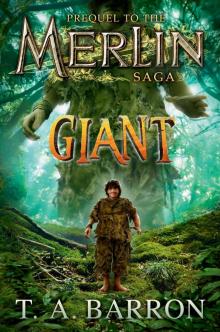 Giant
Giant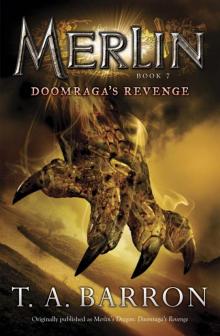 Doomraga's Revenge
Doomraga's Revenge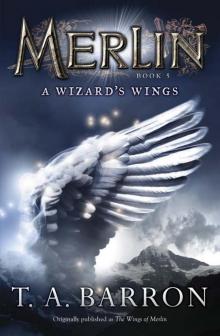 A Wizard's Wings
A Wizard's Wings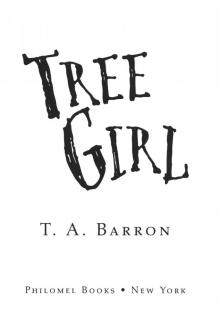 Tree Girl
Tree Girl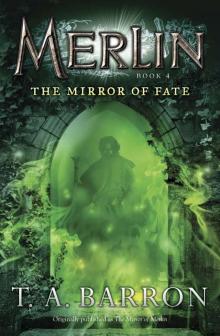 The Mirror of Fate
The Mirror of Fate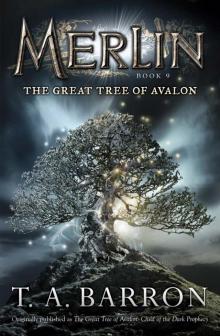 The Great Tree of Avalon
The Great Tree of Avalon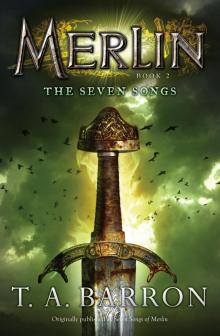 The Seven Songs
The Seven Songs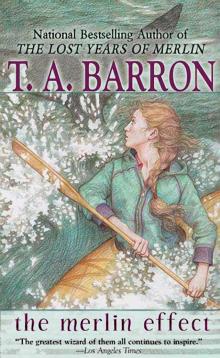 The Merlin Effect
The Merlin Effect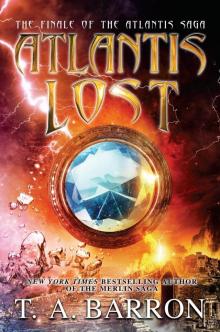 Atlantis Lost
Atlantis Lost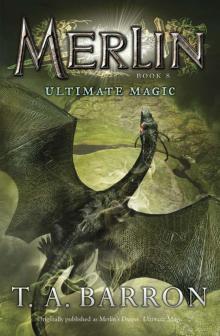 Ultimate Magic
Ultimate Magic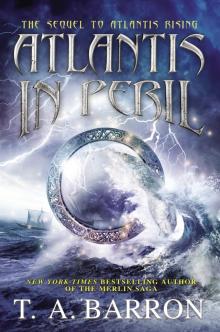 Atlantis in Peril
Atlantis in Peril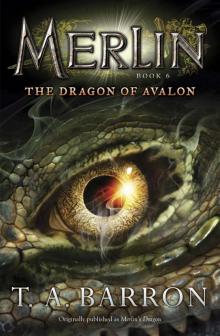 The Dragon of Avalon
The Dragon of Avalon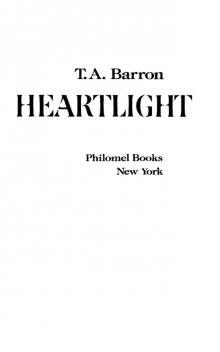 Heartlight
Heartlight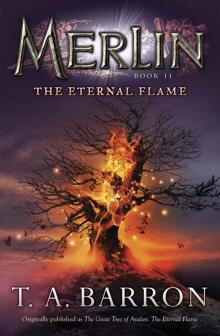 The Eternal Flame
The Eternal Flame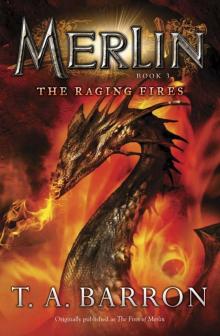 The Raging Fires
The Raging Fires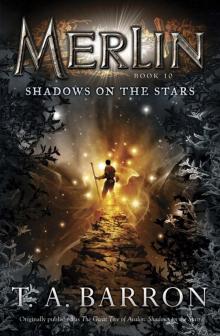 Shadows on the Stars
Shadows on the Stars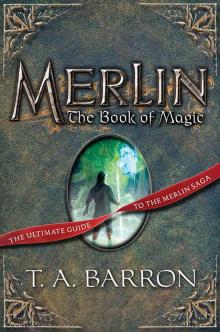 Merlin: The Book of Magic
Merlin: The Book of Magic The Lost Years
The Lost Years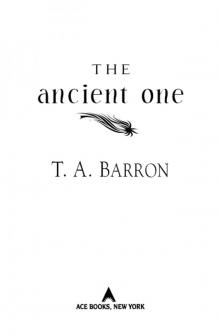 The Ancient One
The Ancient One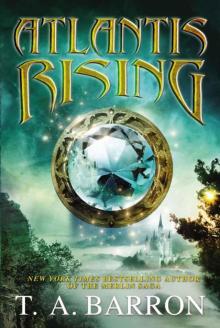 Atlantis Rising
Atlantis Rising